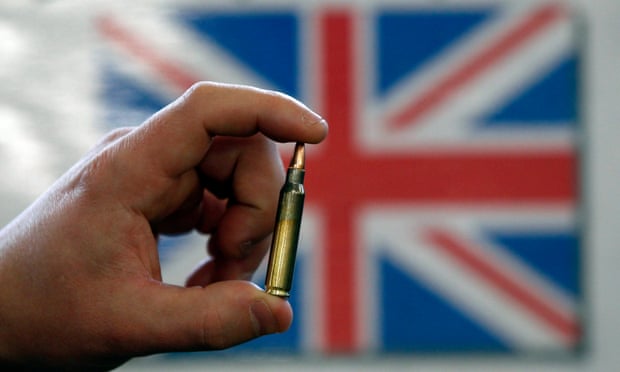Anna StavrianakisA Commons committee is scrutinising UK arms export controls – yet the Yemen conflict isn’t even on the agenda.
Seated in front of a tapestry embroidered with words from the lexicon of “British values” – freedom, equality, tolerance, liberty – ten MPs spent an hour last week taking evidence from NGOs on an issue that calls these values into question: UK arms export policy.
This is the Parliamentary committees on arms export controls (CAEC) in action: a body responsible for scrutinising government policy and holding it to account.
Their current inquiry, into UK arms export policy in 2017, covers both the technicalities of policy – different types of arms export licences and how they are reported on, for example – and larger political questions, such as what happens in the event of a no-deal Brexit.
Nowhere on the agenda is the issue of arms exports to the Saudi-led coalition or the war in Yemen.
The country’s conflict has killed more than 57,000 people since March 2015 and created a cholera epidemic as well as leading the country to the brink of an entirely preventable famine. The Saudi-led coalition is causing twice as many civilian casualties as all other forces fighting in Yemen – including the Houthis, who are also responsible for attacks on civilians and humanitarians. All parties are committing what are likely to be war crimes – and the UK is supplying weapons to one side. How is it that committees responsible for scrutinising government actions are not talking about Yemen?
Inevitably, part of the answer lies in the backstory to this parliamentary reticence. The previous CAEC dissolved in disarray after the committees couldn’t agree on whether to recommend a suspension of exports to Saudi Arabia in 2016.
The CAEC was reformed in October 2017, with Labour MP Graham Jones in the chair – whose apparent partiality is the immediate reason for the current contretemps. Jones went on the parliamentary record attacking what he calls “the dishonesty of non-governmental organisations in this country”, a week before he was to lead the committees in taking evidence from some of those same organisations. Accusing them of “gross exaggeration” in their reporting of civilian deaths in Yemen, and being part of a “bandwagon” of “NGOs and loony leftwing organisations”, his words have backfired, with some media coverage seeing this as bringing his neutrality into question.
As an avid supporter of the Saudi-led coalition, vice-chair of the all-party parliamentary group on Saudi Arabia, MP for an arms-producing constituency and recipient of an expenses-paid trip to the UAE, Jones would do well to remember the edict that people in glass houses shouldn’t throw stones when castigating others. Despite the best efforts of pro-control MPs such as Lloyd Russell-Moyle and Stephen Twigg to get the issue of arms exports to the Saudi-led coalition on the agenda, there is a deathly inertia as Conservative MPs quietly throw their weight behind the convenience of a Labour MP more keen on arms exports than the most arch of Tories.
Whether you agree or disagree with the government’s support of the Saudi-led coalition, there are still rules that govern arms export policy and include things like respect for international humanitarian law. One of the charges levelled by Jones is that the Houthis use human shields, which contributes to increased civilian deaths. Yes, the use of human shields is a war crime.
That doesn’t absolve the Saudi-led coalition of responsibility to engage the humanitarian principles of distinction and proportionality in the protection of civilian objects. Not only is the coalition failing to observe these responsibilities, its military strategy appears to revolve around targeting and pressuring the civilian population.
Discussion of the war in Yemen frequently dissolves swiftly into an argument about Saudi-Iranian rivalry and western fears – amply stoked by the Saudis – of Iranian regional hegemony. There is a wider foreign policy debate about the UK’s role in the Middle East and relationship with friendly states such as Saudi. But the incessant focus on Saudi-Iranian rivalry detracts attention from Yemen itself and the effects of the war on the population and the country’s infrastructure, as well as from the UK’s international obligations – which it was at the forefront of championing.
Given that the UK’s own rules state that it won’t sell weapons to countries where there is a clear risk they might be used in serious violations of international humanitarian law, the slew of evidence from Yemeni and international activists about attacks on medical facilities and schoolchildren should have led to restrictions on weapons transfers to the coalition – not least because the UK government is clear that there is no military solution to the conflict.
Yet in nearly four years of war, weapons exports to Saudi have sky-rocketed, now accounting for almost half of UK arms exports. Since March 2015, more than £4.7bnin arms exports have been licensed to the kingdom, and that’s just the weapons we know about: government statistics significantly under-report on the likely value of exports.
This is a perverse outcome: the UK operates a policy that includes explicit protection of international humanitarian law and that the government incessantly claims is one of the most robust regimes in the world. Yet we see growing levels of harm that come from exponentially increased weapons transfers. The Oxford dictionary defines “reckless” as “heedless of danger or the consequences of one’s actions”. This is a truer characterisation of government arms export policy: replete with bureaucratic process and political rhetoric, but indifferent to consequences.

No comments:
Post a Comment